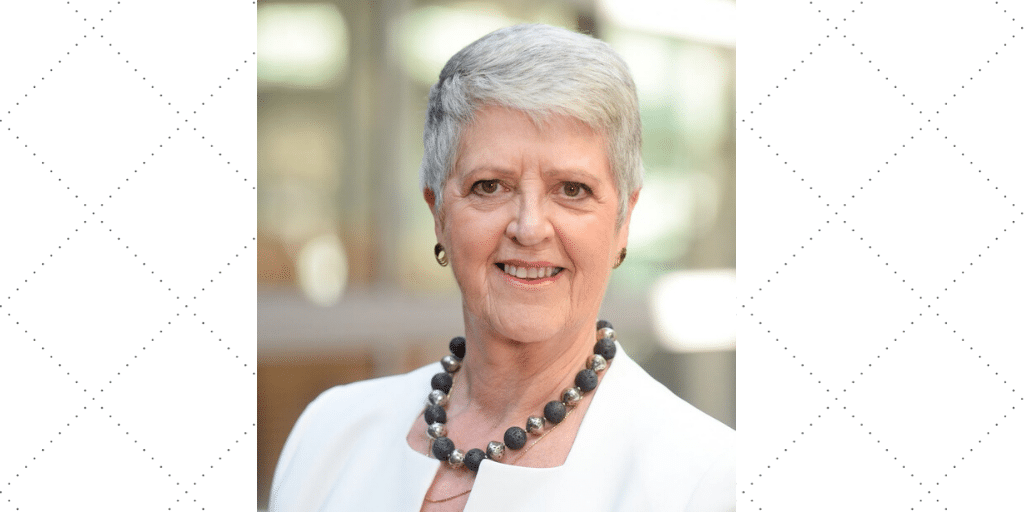There are over 300,000 children living in rural and remote areas of Australia in need of urgent developmental and mental health support, and Royal Far West narrows the distance between those children and the care they need.
2019 Third Sector CEO of the Year, Lindsay Cane AM caught up with Third Sector news about how Royal Far West successfully delivers remote, technology-driven and in-community programs, in addition to services in their Centre for Country Kids in Manly, NSW, to help rural communities and families address the developmental health, education and disability needs of their children
“We have a clear and unequivocal mission, to help country kids. This incredible clarity of mission gives us a powerful conviction that drives our services. We know what we’ve got to do. We have incredible strength through that clarity, to deliver, for country kids”, Lindsay said.
“I am proud to speak for as a member of the third sector around the things that matter,” she continues. “The award was a recognition for the people we all serve, and they are increasingly getting attention as they should. The Third Sector award amplifies my voice for both my charity and the sector, which helps amplify our collective voice.”
Value-driven goals and direction
Raised in Manly in a strong values-driven family, Lindsay remembers Royal Far West as a local charity that she and her three siblings shared Christmas with as a kid. Now, serving as a Chief Executive Officer, she notes she has come “full circle”.
Lindsay recalls her childhood when in the late ‘50s: “You would always come to Jack and Gwen’s house. Our door was always open to new families coming into the community. We worked together to build a strong sense of community and we would support each other. Always us kids had to do things in our holidays or after school to help other people”, she said.
Lindsay also recognises how her previous professions and work roles have given her the skills and experience to manage the complexities of Royal Far West. Her first degree was in physiotherapy, after which she taught at the University of Sydney, followed by careers in health management, hospital design, computer sales and finally, non-profit sector leadership.
“I realised that in order to become an informed business leader, I needed financial skills to complement the strong people skills I had developed through my physiotherapy profession, so I joined the computer industry to understand the craft of managing sales cycles and large amounts of money. That was very insightful and helped me understand the different motivations of people and as a result, I learnt to read people even better,” she said. “The combination of education, health, business, financial and people skills are a necessary cocktail for resilient third sector leaders, and for all leaders really .“
Lindsay has previously held leadership roles with The Australian Physiotherapy Association, The Asthma Foundation (NSW) and Netball Australia. After several years leading Australian Netball back to World Champion status, she took a break from her career to travel.
Six months into her hiatus, the opportunity to “hold the fort” at Royal Far West for three months while they looked for their new CEO, dropped into her lap. After only a month at Royal Far West, she decided she wanted to stay in the charity that was then 87 years old and a part of her childhood. It seemed destined for her.
Lindsay had a major decision to make during this time – either to recommend repurposing the organisation down or bring it back to the unique organisation it had been in its past. She looked at the size of the problem in rural Australia and saw a great need that still existed – thousands of children living in rural areas could not get access to the services they needed.
“I knew I wanted to stay and work hard to help Royal Far West develop a new suite of services that would help address the challenges in rural Australia for the next century. We fondly referred to Royal Far West then as a ’90 year startup’!”
Lindsay stayed in the organisation and the rest is history.
Friendship that led to change and growth
Carrying the full weight of the issues and embracing the enthusiasm of her Royal Far West colleagues, Lindsay declared, “let’s go – let’s work to bring out the best in this magnificent organisation. Let this place be special again.”
“We have always had a strong belief that if we “do the right thing, the money will come,” she said. “Our view has never been to chase various funding pots, but to focus on that mission of helping country kids, and trust that the Universe will help us.”
They started by building best practices in financial and HR management; replacing the 8–year–old computers that had been given to them second-hand; reaching out to community leaders and decision makers and appealing to businesses and local communities to support them. She set out to develop Royal Far West into a thought-leader that could inspire others and be both a clever and nimble organisation. Always their goal was to identify where the gaps in service exist and to fill those gaps so as to support the public health system and enable it to do more for rural people.
“We want to always work aligned with government, even though we are a private charity. Governments seek to solve problems through policy, but they rely on strong and trusted community partners like Royal Far West to help in delivering the services that put those policies into effect.”
In her eight-year journey of transformation as CEO, she said the Third Sector award was a real treat and especially timely, as they completed the transition into their new building, The Centre for Country Kids. They’ve grown 10–fold over the past eight years, serving 800 families in 2011 to 10,000 families in 2019, and Lindsay said this was possible because of partnerships, aligning with government, going closer to the rural communities they serve and ultimately implementing what they call “friendraising.”
“Being first a friend-raiser, as well as a fund-raiser, is our motto. Friends support you and it goes both ways; strong and enduring friendships with our corporate partners, governments and other NGOs is really important to us. Friends ring each, get involved and say, ‘let’s go have coffee and a chat,” Lindsay said. “Friends have ideas and do things to help you . . . in this way we have developed lots of corporate, philanthropic, government and community friends who appreciate having a relationship with Royal Far West and feel closely linked to our mission to help rural Australia. In that way we are able to give back to our friends – and the people we are serving benefit!
Charities that have a strong and sustainable business can trace that back to the strength and commitment of their people, and that clarity of purpose, she believes. She encourages people to “be thrilled about this sector. Come work in it because it is most satisfying to work for a clear purpose.”
A strong friendship and a partnership with HP enabled each of their 160 staff to be issued with a brand-new HP laptop in December 2018, ensuring they could deliver a state-of-the-art, best-practice service model that mobilised the staff and measurably improved productivity. In return, HP said the opportunity to work with Royal Far West ‘gladdened our heart’ and ‘inspired our salespeople’. To enable their staff to be engaged with the charity’s cause and its people, HP conducts their sales meetings in Royal Far West’s Conference room, and they continue to support the charity in multiple ways.
The transformation to technology
For Lindsay, being CEO of Royal Far West meant leading her team through a total organisational transformation. Royal Far West has been helping children and families in rural and remote areas for 95 years, but it’s only under her tenure that the charity has embraced technology.
“As the business leader, I knew the organisation was doing beautiful work but was hampered with an old model of service, Lindsay shared. “As a contemporary health leader, I knew the service needed to be delivered as close to a child’s home as possible. I pondered how we could take our very clever workforce away from Manly.” This led Lindsay to consider taking the service onto an online technology platform.
The first challenge was how to turn a traditional and expert face-to-face service into an equally effective online therapy service. She shared that it was a huge intellectual challenge for her staff initially, who had only practiced face-to-face therapy in their careers. But some innovative speech pathologists led the way and looked to gamification to change their practice. The charity quickly found that overall the children were very receptive to receiving their therapy through a computer screen.
“Kids are so used to computers and they like this very personalised service,” she said. “Our Speech Therapists, Occupational Therapists and Psychologists realised the benefits and embraced this method of delivering therapy, modifying their therapy into therapeutic games and programs that they could be played on-line with the children.
The next challenge was for the charity to liaise with rural and remote-based clinicians to link them to children needing support in their local areas, so they started working closely with local healthcare professionals, schools, communities, parents and carers to deliver services in the most effective way possible.
One of the major partnerships in the initial phase was with The Bupa Health Foundation which helped Royal Far West evaluate its early online speech therapy program. Lindsay said the Foundation helped Royal Far West trial a video-link speech pathology program to kids in a remote area in Queensland.
They granted us $80,000 to evaluate the intervention and then develop the proof of concept, which we needed to be able to take to future funders, to show that online therapy worked,” Lindsay said.
Five years later, as Royal Far West’s Telecare Program was rapidly expanding across the nation, but it was fast running out the resources to keep expanding the service, Royal Far West welcomed an announcement from the Federal Government that it would partner with Royal Far West to help continue the expansion of this vital service.
We had proven with our Telecare platform that we can deliver to more than 100 schools with our tele–speech, tele-mental health, tele-regulation and tele–teacher support programs. The Federal Government looked at our performance and our data and could see this effective solution being rolled out to remote and isolated schools and families. They have helped to double the support we can provide in the coming years.”
Working in partnership with preschools, primary schools, parents and local clinicians, the Telecare for Kids programs offer assessment, therapy and capacity building covering speech, occupational therapy, and psychology disciplines.
These programs are evidence-informed, delivered by specialist paediatric allied health staff, and have demonstrated ability to help children achieve their goals. All that’s required is a good internet connection and a computer with a camera, microphone and speakers. In 2017 Royal Far West’s Tele-disability program won the National Disability Service Award for Innovation.
Road to sustainability
Lindsay said, “looking after my staff is so important to sustain the organisation and continue our work. They are resilient, clever and appreciated. We have to work hard though to protect our staff from the strain of delivering services every week in sometimes tough circumstances, but the reward is great when we see how our families respond, and how country people build up their own resilience and skills after being in our programs. We adhere strongly to our benevolent culture and values of Respect, Integrity, Care and Energy.”
In addition, she said it’s important to work with local experts and health professionals to enable then to be incubators of ideas and local solutions, especially through university partners.
In May this year, Royal Far West and Charles Sturt University welcomed a Federal Government budget commitment of $19.7 million to strengthen Royal Far West’s national Telecare service.
“We are bringing all the smart work together and doing more to build community capacities. It’s a combination of finance and investing in our fundraising,” Lindsay said.“
Aside from the new Centre for Country Kids in Manly, Royal Far West is in a unique and fortunate position of owning a substantial parcel of beachfront land, thanks to the foresight and generosity of its early benefactors, on which Royal Far West is currently planning to extend its service and build new services to support country kids and families.
“We are a fast-growing charity, and in order to plan our future with confidence, we need to know we can cover our costs. Fundraising is a big part of our work. We rely on our fundraising friends to help us stay ahead. We rely on our government partners to travel with us to strengthen rural Australia. We are fortunate however to also have our own land assets that can help fund future services and I am currently in the process of working out how to do that,” Lindsay said. ”We believe in our motto of ‘no distance is too far’ and are proud to use technology along with our human capital to reach children in need in the most remote regions of Australia.












